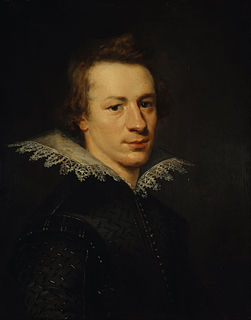A Quote by William Wordsworth
Stern daughter of the voice of God! O Duty! if that name thou love Who art a light to guide, a rod To check the erring and reprove.
Related Quotes
Love all God’s creation, both the whole and every grain of sand. Love every leaf, every ray of light. Love the animals, love the plants, love each separate thing. If thou love each thing thou wilt perceive the mystery of God in all; and when once thou perceive this, thou wilt thenceforward grow every day to a fuller understanding of it: until thou come at last to love the whole world with a love that will then be all-embracing and universal.
When thou art quiet and silent, then art thou as God was before nature and creature; thou art that which God then wats; thou art that whereof he made thy nature and creature: Then thou hearest and seest even with that wherewith God himself saw and heard in thee, before every thine own willing or thine own seeing began.
Either all things proceed from one intelligent source and come together as in one body, and the part ought not to find fault with what is done for the benefit of the whole; or there are only atoms, and nothing else than a mixture and dispersion. Why, then, art thou disturbed? Say to this ruling faculty, Art thou dead, art thou corrupted, art thou playing the hypocrite, art thou become a beast, dost thou herd and feed with the rest?
Stick to God! Who cares what comes to the body or to anything else! Through the terrors of evil, say-my God, my love! Through the pangs of death, say-my God, my love! Through all the evils under the sun, say-my God, my love! Thou art here, I see Thee. Thou art with me, I feel Thee. I am Thine, take me. I am not of the world's but Thine, leave not then me.
He is everywhere, the pure and formless One, the Almighty and the All-merciful. "Thou art our father, Thou art our mother, Thou art our beloved friend, Thou art the source of all strength; give us strength. Thou art He that beareth the burdens of the universe; help me bear the little burden of this life." Thus sang the Rishis of the Vedas. And how to worship Him? Through love. "He is to be worshipped as the one beloved, dearer than everything in this and the next life."
Thou silent power, whose welcome sway charms every anxious thought away; in whose divine oblivion drown'd, sore pain and weary toil grow mild, love is with kinder looks beguiled, and Grief forgets her fondly cherish'd wound; oh, whither hast thou flown, indulgent god? God of kind shadows and of healing dews, whom dost thou touch with thy Lethaean rod? Around whose temples now thy opiate airs diffuse?




































